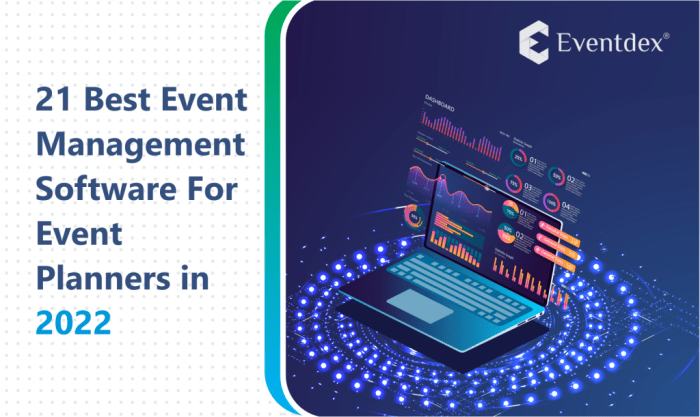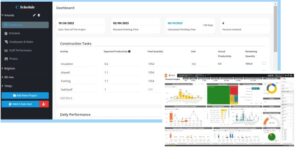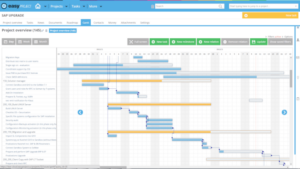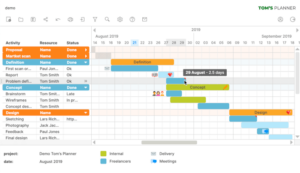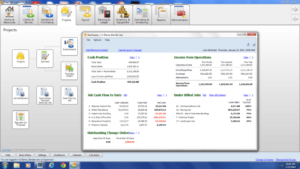Best event management software can be your secret weapon for creating unforgettable events, whether you’re planning a small gathering or a large-scale conference. These powerful tools streamline the entire event planning process, from initial ideation to post-event analysis. Imagine having a single platform to manage registration, ticketing, marketing, communication, budgeting, and more – all while gaining valuable insights into attendee behavior and event performance.
In this guide, we’ll explore the key features, benefits, and types of event management software. We’ll also provide a detailed comparison of top solutions, help you choose the right software for your needs, and offer best practices for maximizing its potential.
Event Management Software: A Guide to Seamless Planning and Execution
Planning and executing successful events requires meticulous organization, attention to detail, and the ability to manage multiple tasks simultaneously. Event management software offers a comprehensive solution to streamline these processes, making event planning more efficient and effective.
Importance of Choosing the Right Event Management Software
Selecting the right event management software is crucial for achieving event success. The right software will provide the tools and functionalities necessary to manage every aspect of your event, from registration and ticketing to venue selection and budget management. Choosing the wrong software can lead to inefficiencies, errors, and ultimately, a less successful event.
Key Features and Functionalities of Event Management Software
Event management software offers a wide range of features and functionalities designed to simplify event planning and execution. Here are some of the key features you should look for:
Registration and Ticketing
- Online registration forms: Event management software allows you to create and manage online registration forms, enabling attendees to register for your event easily and securely.
- Ticketing and payment processing: The software integrates with payment gateways, allowing you to sell tickets online and process payments securely.
- Attendee management: Event management software provides tools to manage attendee data, including contact information, registration details, and dietary restrictions.
Venue Management
- Venue search and booking: Event management software helps you find and book suitable venues based on your event requirements, including capacity, location, and amenities.
- Floor plan management: You can create and manage floor plans, assign seating arrangements, and visualize the layout of your event.
- Venue communication: The software facilitates communication with venue staff and vendors, ensuring seamless coordination and timely updates.
Budget Management
- Expense tracking: Event management software allows you to track all event expenses, from venue rental to catering and marketing.
- Budget forecasting: You can create and manage budgets, track spending, and identify potential overruns.
- Financial reporting: The software provides comprehensive financial reports, giving you insights into your event’s financial performance.
Marketing and Promotion
- Email marketing: Event management software integrates with email marketing platforms, allowing you to send promotional emails to potential attendees.
- Social media integration: The software can be used to promote your event on social media platforms, reaching a wider audience.
- Website integration: You can embed registration forms and ticketing options on your event website.
Event Management and Coordination
- Task management: Event management software allows you to create and assign tasks to team members, ensuring everyone is aware of their responsibilities.
- Communication tools: The software provides communication channels, such as chat and forums, for team collaboration and updates.
- Event scheduling: You can create and manage event schedules, including speaker presentations, workshops, and entertainment.
Reporting and Analytics
- Event performance reports: Event management software provides comprehensive reports on event performance, including attendance, registration data, and feedback.
- Attendee engagement metrics: The software can track attendee engagement, such as website visits, social media interactions, and survey responses.
- Data analysis: You can use the software to analyze event data and identify areas for improvement in future events.
Key Features and Functionalities

Event management software is designed to streamline and simplify every aspect of event planning, from initial conceptualization to post-event analysis. These robust platforms offer a comprehensive suite of features that empower event organizers to manage tasks efficiently, enhance attendee experiences, and achieve successful outcomes.
Event Planning and Scheduling
Event planning and scheduling features are essential for organizing events effectively. These features provide tools to manage timelines, allocate resources, and ensure seamless execution.
| Feature | Description | Benefits | Examples |
|---|---|---|---|
| Event Calendar | A visual representation of event dates, deadlines, and tasks. | Provides a centralized view of all event activities, facilitating better time management and coordination. | Visualizing event deadlines, task assignments, and key milestones. |
| Task Management | Allows users to create, assign, and track tasks related to the event. | Enhances team collaboration and accountability by assigning tasks to specific individuals or teams. | Creating to-do lists for vendor communication, venue booking, and marketing campaigns. |
| Resource Allocation | Enables the allocation of resources, such as staff, equipment, and budget, to specific event activities. | Optimizes resource utilization, preventing overbooking and ensuring adequate resources for each event aspect. | Assigning event staff to different roles, allocating budget for catering and entertainment, and managing equipment rentals. |
Registration and Ticketing
Registration and ticketing features enable event organizers to manage attendee registration, ticket sales, and payment processing. These features simplify the process of collecting attendee information, generating tickets, and managing payments.
| Feature | Description | Benefits | Examples |
|---|---|---|---|
| Online Registration | Allows attendees to register for events online, providing convenience and accessibility. | Simplifies the registration process for attendees, reducing manual paperwork and increasing efficiency. | Creating registration forms for conferences, workshops, and webinars. |
| Ticket Sales and Management | Facilitates the sale of tickets, including different ticket types, pricing options, and discounts. | Enables event organizers to manage ticket inventory, track sales, and generate reports on ticket revenue. | Selling early bird tickets, VIP tickets, and group discounts for concerts and festivals. |
| Payment Processing | Integrates with payment gateways to process online payments securely and efficiently. | Streamlines payment collection, reduces the risk of payment fraud, and provides convenient payment options for attendees. | Accepting credit card payments, PayPal, and other popular payment methods. |
Marketing and Promotion
Marketing and promotion features provide tools for reaching target audiences, promoting events, and generating interest. These features enhance event visibility, attract potential attendees, and drive ticket sales.
| Feature | Description | Benefits | Examples |
|---|---|---|---|
| Email Marketing | Enables event organizers to send targeted email campaigns to promote events and engage with potential attendees. | Allows for personalized communication, fostering a sense of community and increasing event awareness. | Sending email newsletters with event updates, promotional offers, and speaker announcements. |
| Social Media Integration | Connects with social media platforms to share event information and engage with potential attendees. | Expands event reach, promotes interaction with attendees, and fosters a sense of community. | Sharing event details, photos, and videos on Facebook, Twitter, and Instagram. |
| Website Integration | Integrates with event websites to create landing pages for event registration, ticket sales, and information. | Provides a centralized hub for event information, simplifying access and increasing visibility. | Creating dedicated event websites with registration forms, ticketing options, and event details. |
Communication and Collaboration
Communication and collaboration features enable event organizers to communicate effectively with attendees, vendors, and team members. These features facilitate information sharing, task delegation, and real-time updates.
| Feature | Description | Benefits | Examples |
|---|---|---|---|
| Attendee Communication | Provides tools for communicating with attendees, such as email, SMS, and in-app messaging. | Ensures attendees are informed about event updates, changes, and important announcements. | Sending event reminders, sharing speaker information, and providing directions. |
| Vendor Management | Facilitates communication and collaboration with vendors, ensuring smooth event execution. | Streamlines vendor communication, contract management, and payment processing. | Managing vendor contracts, tracking payments, and coordinating logistics. |
| Team Collaboration | Enables team members to collaborate on event planning, task management, and communication. | Promotes team coordination, reduces communication silos, and ensures everyone is on the same page. | Sharing event schedules, assigning tasks, and discussing event logistics. |
Budgeting and Finance
Budgeting and finance features help event organizers manage event expenses, track revenue, and generate financial reports. These features provide a comprehensive view of event finances, enabling informed decision-making and financial control.
| Feature | Description | Benefits | Examples |
|---|---|---|---|
| Budgeting Tools | Provide tools for creating and managing event budgets, tracking expenses, and forecasting revenue. | Ensures financial accountability, prevents overspending, and facilitates informed decision-making. | Creating budget categories for venue rental, catering, and marketing expenses. |
| Expense Tracking | Allows event organizers to track expenses, categorize them, and generate reports on spending. | Provides a detailed overview of event costs, enabling better financial control and cost optimization. | Tracking expenses for venue rental, catering, and event staff. |
| Revenue Tracking | Enables event organizers to track revenue from ticket sales, sponsorships, and other sources. | Provides insights into event profitability, facilitating financial analysis and decision-making. | Tracking ticket sales, sponsorship revenue, and merchandise sales. |
Reporting and Analytics, Best event management software
Reporting and analytics features provide valuable insights into event performance, attendee engagement, and overall success. These features enable event organizers to measure the impact of their efforts, identify areas for improvement, and make data-driven decisions for future events.
| Feature | Description | Benefits | Examples |
|---|---|---|---|
| Event Attendance Reports | Generate reports on event attendance, including registration data, check-in times, and attendee demographics. | Provides insights into event reach, audience demographics, and overall event participation. | Analyzing registration data, identifying attendee demographics, and tracking check-in times. |
| Engagement Analytics | Track attendee engagement metrics, such as session attendance, social media activity, and survey responses. | Provides insights into attendee satisfaction, session popularity, and overall event engagement. | Tracking session attendance, analyzing social media engagement, and collecting feedback through surveys. |
| Financial Reports | Generate reports on event expenses, revenue, and profitability, providing a comprehensive view of event finances. | Enables event organizers to evaluate financial performance, identify areas for cost optimization, and make data-driven decisions for future events. | Analyzing event expenses, tracking revenue streams, and evaluating overall event profitability. |
Benefits of Using Event Management Software
Event management software can significantly streamline the planning and execution of events, from small gatherings to large-scale conferences. By leveraging technology, event organizers can optimize various aspects of event management, leading to increased efficiency, improved communication, and ultimately, a more successful event.
Time-Saving Benefits
Event management software automates many repetitive tasks, freeing up valuable time for organizers to focus on more strategic aspects of event planning. For instance, software can automatically send out event invitations, manage RSVPs, and track registration fees. This automation eliminates the need for manual data entry and reduces the risk of human error, saving time and resources.
Types of Event Management Software
Event management software comes in various forms, each tailored to meet the specific needs of different event organizers and their unique circumstances. Understanding the different types of software available can help you choose the best solution for your event planning and execution requirements.
Event Management Software Categorized by Target Audience
Event management software can be categorized based on the target audience it serves. This categorization helps organizations choose the software that aligns best with their size, budget, and event complexity.
- Small Businesses and Startups:These software solutions are designed for small businesses and startups with limited budgets and smaller event sizes. They often offer simplified features and a user-friendly interface, making them easy to learn and use. Examples include:
- Eventbrite:A popular platform for creating and managing events, particularly for ticketing and registration.
It offers basic event management features, including email marketing and reporting.
- Social Tables:This software is known for its user-friendly floor plan and seating chart tools, ideal for smaller events with a focus on spatial planning.
- Eventbrite:A popular platform for creating and managing events, particularly for ticketing and registration.
- Large Corporations and Enterprises:Designed for large organizations with complex events and high budgets, these software solutions offer advanced features, scalability, and integration capabilities. Examples include:
- Cvent:A comprehensive event management platform with features for event planning, registration, venue sourcing, and attendee engagement. It caters to large corporations and organizations with complex events.
- Eventzilla:A robust platform for managing large-scale events, offering features like registration, ticketing, website creation, and analytics. It supports multi-event management and provides comprehensive reporting.
- Specific Event Types:Some software solutions specialize in specific event types, such as conferences, webinars, or trade shows. These specialized platforms offer features tailored to the unique needs of each event type. Examples include:
- Whova:Designed for conferences and large meetings, Whova offers features like mobile apps, networking tools, and session management.
It focuses on enhancing attendee engagement and networking.
- On24:This platform specializes in webinars and virtual events, providing tools for hosting, registration, and engagement. It focuses on creating interactive and engaging online experiences.
- Whova:Designed for conferences and large meetings, Whova offers features like mobile apps, networking tools, and session management.
Key Differences Between Types of Event Management Software
The key differences between various types of event management software lie in their features, functionalities, and target audience.
Choosing the best event management software can be a daunting task, but it’s crucial for streamlining your workflow and maximizing efficiency. Similar to how a best construction accounting software can help manage complex financial transactions, the right event management platform can handle everything from registration and ticketing to vendor management and post-event analysis, ensuring a seamless and successful event experience.
- Feature Set:Small business software often offers a limited set of features, while enterprise solutions provide a comprehensive suite of tools. Specialized software focuses on features relevant to specific event types.
- Scalability:Enterprise solutions are designed for scalability, handling large events and complex workflows. Small business software may have limitations in managing large-scale events.
- Integration:Enterprise software often integrates with other business systems, such as CRM and marketing automation platforms. Small business software may offer limited integration options.
- Pricing:Small business software typically offers more affordable pricing plans, while enterprise solutions come with higher costs. Specialized software may have pricing models tailored to specific event types.
Factors to Consider When Choosing Event Management Software
Selecting the right event management software is crucial for streamlining your event planning process, maximizing efficiency, and ensuring a successful outcome. To make an informed decision, consider several factors that align with your organization’s specific needs and goals.
Identifying Specific Needs and Requirements
Understanding your organization’s unique requirements is paramount in choosing the right event management software. This involves identifying the specific needs and challenges associated with your events. For example, if your organization hosts large-scale conferences with complex registration processes and multiple speaker sessions, you’ll need software that can handle complex registration forms, manage speaker profiles, and create detailed schedules.
Conversely, if you primarily organize smaller, intimate events, a simpler software solution might suffice.
Budget Considerations
Event management software comes in various price ranges, so carefully considering your budget is essential. Some software solutions offer free trials or basic plans that are affordable for small organizations or those starting out. However, as your event needs grow, you might need to upgrade to a paid plan with more features and functionalities.
It’s important to evaluate the cost-benefit analysis of each software solution and choose one that provides the best value for your investment.
User-Friendliness and Ease of Use
Event management software should be intuitive and user-friendly, allowing both experienced event planners and novice users to navigate the platform easily. Look for software with a clean interface, clear instructions, and helpful tutorials. User-friendliness enhances efficiency, reduces training time, and minimizes the learning curve for your team.
Scalability and Adaptability
Your event management software should be scalable and adaptable to accommodate your organization’s growth and changing event needs. Consider factors like the number of events you host, the size of your audience, and the complexity of your events. Choosing software that can handle a growing workload and adapt to evolving requirements ensures a smooth transition as your organization expands.
Integration with Other Tools and Systems
Seamless integration with other tools and systems is crucial for efficient event planning. Consider software that integrates with existing platforms like email marketing services, payment gateways, CRM systems, and social media platforms. Integration streamlines data flow, automates processes, and reduces the risk of errors.
Customer Support and Training Resources
Reliable customer support and comprehensive training resources are essential for a positive user experience. Look for software providers that offer responsive customer support, comprehensive documentation, and online tutorials. These resources ensure you can quickly resolve any issues, learn new features, and maximize the software’s potential.
Top Event Management Software Solutions: Best Event Management Software
Choosing the right event management software can be a game-changer for your event planning success. There are numerous options available, each with its own set of features, strengths, and weaknesses. This section will delve into some of the most popular and highly-regarded event management software solutions, providing you with a comprehensive overview to aid in your decision-making process.
Event Management Software Solutions
The following table provides a detailed comparison of popular event management software solutions, highlighting their key features, advantages, and disadvantages.
| Software Name | Key Features | Pros | Cons |
|---|---|---|---|
| Eventbrite | Event creation and ticketing, marketing tools, registration management, analytics, attendee management, mobile app integration, reporting, and payment processing. | User-friendly interface, robust ticketing and registration capabilities, strong marketing tools, and extensive event analytics. | Limited customization options, higher fees for certain features, and potential limitations with complex events. |
| Social Tables | Floor plan design, seating charts, event layout management, vendor management, registration and ticketing, and event analytics. | Excellent floor plan and layout design tools, seamless integration with other event management systems, and comprehensive reporting features. | Higher pricing compared to some alternatives, and limited customization options for specific event types. |
| Cvent | Comprehensive event management platform, encompassing registration, ticketing, venue sourcing, catering management, event marketing, attendee management, and reporting. | Wide range of features, robust event marketing capabilities, strong vendor network, and comprehensive reporting tools. | Complex user interface, higher pricing compared to some alternatives, and potentially overwhelming for smaller events. |
| Whova | Event app development, attendee networking, mobile event management, session scheduling, speaker management, and event analytics. | Excellent event app development features, robust attendee networking tools, seamless integration with other platforms, and comprehensive event analytics. | Limited ticketing and registration capabilities, potentially less suitable for large-scale events, and higher pricing for advanced features. |
Best Practices for Using Event Management Software
Event management software can be a powerful tool for streamlining your event planning and execution process. To fully leverage its potential, it’s essential to understand best practices for setup, configuration, and ongoing use. This section will guide you through the process, offering practical tips and strategies to maximize the software’s benefits.
Setting Up and Configuring Event Management Software
The initial setup and configuration are crucial for ensuring the software effectively meets your event needs. Here’s a step-by-step guide:
- Choose the Right Software:Select a platform that aligns with your event type, size, and budget. Consider features like registration, ticketing, marketing, and reporting.
- Create an Account and Define Your Event:Set up an account and define your event details, including the name, date, location, and target audience.
- Configure Event Settings:Customize the software’s settings to match your event’s requirements. This includes registration options, payment gateways, communication preferences, and branding elements.
- Set Up Your Event Website or Landing Page:Integrate the software with your website or create a dedicated landing page for event registration and information.
- Import Existing Data:If you have existing contact lists or registration data, import them into the software to save time and effort.
- Test and Review:Before launching your event, thoroughly test all software functionalities, including registration, payment processing, and communication channels.
Organizing and Managing Events Effectively
Once your software is set up, effective organization and management are key to successful event planning. Here are some practical tips:
- Create a Detailed Event Timeline:Utilize the software’s calendar or task management features to create a comprehensive event timeline, including deadlines, milestones, and assignments.
- Manage Your Budget:Track your expenses and income using the software’s budget management tools. Set spending limits and monitor your budget closely to avoid overspending.
- Communicate Effectively:Utilize the software’s communication features to send automated emails, SMS messages, and notifications to attendees, speakers, and vendors.
- Assign Roles and Responsibilities:Leverage the software’s user management system to assign roles and responsibilities to team members, ensuring clear accountability and collaboration.
- Track Registrations and Attendance:Monitor registration numbers and attendee attendance using the software’s reporting tools. This data can help you assess the event’s success and make adjustments for future events.
Using Software Features to Enhance Event Planning and Execution
Event management software offers a wide range of features designed to streamline planning and enhance event execution.
- Utilize the Event Planner:Use the software’s event planner to create a detailed agenda, schedule speakers, manage sessions, and allocate resources.
- Leverage Automation:Automate tasks such as email marketing, registration confirmations, and reminder notifications to save time and ensure consistency.
- Integrate with Other Tools:Connect the software with other tools you use, such as CRM systems, marketing automation platforms, and social media platforms, for seamless data sharing and workflow optimization.
- Create Interactive Experiences:Utilize the software’s features to create interactive experiences, such as live polls, Q&A sessions, and virtual networking opportunities.
Utilizing Software for Reporting and Analytics
Event management software provides valuable reporting and analytics tools to measure event success and optimize future events.
- Track Key Performance Indicators (KPIs):Identify and track key performance indicators such as registration rates, attendance, engagement, and feedback.
- Analyze Event Data:Use the software’s reporting tools to generate reports on registration trends, attendee demographics, and event satisfaction.
- Identify Areas for Improvement:Analyze data to identify areas for improvement in future events, such as marketing strategies, event content, or logistical processes.
- Make Data-Driven Decisions:Use the insights gained from reporting and analytics to make informed decisions about future events, such as pricing, marketing channels, and event formats.
Final Review
Choosing the right event management software can be a game-changer for your event planning success. By leveraging the power of these tools, you can save time, improve efficiency, enhance communication, and make data-driven decisions to create truly memorable experiences. So, take the time to explore the options, consider your specific needs, and embrace the potential of event management software to transform your events.

